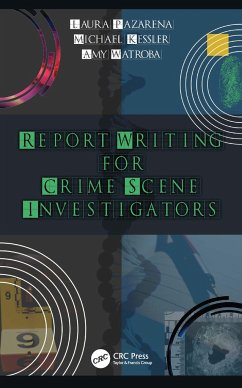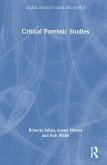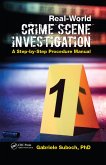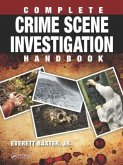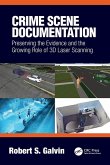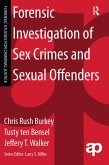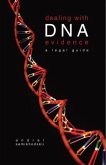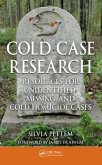- Gebundenes Buch
- Merkliste
- Auf die Merkliste
- Bewerten Bewerten
- Teilen
- Produkt teilen
- Produkterinnerung
- Produkterinnerung
Report Writing for Crime Scene Investigators provides the essentials to effective report writing for the active field Crime Scene Investigator, including important differences between law enforcement and CSI reports as well as reports for attorneys and the courts.
Andere Kunden interessierten sich auch für
![Critical Forensic Studies Critical Forensic Studies]() Roberta JulianCritical Forensic Studies199,99 €
Roberta JulianCritical Forensic Studies199,99 €![Real-World Crime Scene Investigation Real-World Crime Scene Investigation]() Gabriele SubochReal-World Crime Scene Investigation171,99 €
Gabriele SubochReal-World Crime Scene Investigation171,99 €![Complete Crime Scene Investigation Handbook Complete Crime Scene Investigation Handbook]() Everett Baxter JrComplete Crime Scene Investigation Handbook183,99 €
Everett Baxter JrComplete Crime Scene Investigation Handbook183,99 €![Crime Scene Documentation Crime Scene Documentation]() Robert GalvinCrime Scene Documentation95,99 €
Robert GalvinCrime Scene Documentation95,99 €![Forensic Investigation of Sex Crimes and Sexual Offenders Forensic Investigation of Sex Crimes and Sexual Offenders]() Chris Rush BurkeyForensic Investigation of Sex Crimes and Sexual Offenders241,99 €
Chris Rush BurkeyForensic Investigation of Sex Crimes and Sexual Offenders241,99 €![Dealing with DNA Evidence Dealing with DNA Evidence]() Andrei SemikhodskiiDealing with DNA Evidence200,99 €
Andrei SemikhodskiiDealing with DNA Evidence200,99 €![Cold Case Research Resources for Unidentified, Missing, and Cold Homicide Cases Cold Case Research Resources for Unidentified, Missing, and Cold Homicide Cases]() Silvia PettemCold Case Research Resources for Unidentified, Missing, and Cold Homicide Cases200,99 €
Silvia PettemCold Case Research Resources for Unidentified, Missing, and Cold Homicide Cases200,99 €-
-
-
Report Writing for Crime Scene Investigators provides the essentials to effective report writing for the active field Crime Scene Investigator, including important differences between law enforcement and CSI reports as well as reports for attorneys and the courts.
Hinweis: Dieser Artikel kann nur an eine deutsche Lieferadresse ausgeliefert werden.
Hinweis: Dieser Artikel kann nur an eine deutsche Lieferadresse ausgeliefert werden.
Produktdetails
- Produktdetails
- Verlag: Taylor & Francis
- Seitenzahl: 152
- Erscheinungstermin: 29. Juni 2022
- Englisch
- Abmessung: 234mm x 156mm x 11mm
- Gewicht: 426g
- ISBN-13: 9780367359959
- ISBN-10: 0367359952
- Artikelnr.: 63265271
- Herstellerkennzeichnung
- Libri GmbH
- Europaallee 1
- 36244 Bad Hersfeld
- gpsr@libri.de
- Verlag: Taylor & Francis
- Seitenzahl: 152
- Erscheinungstermin: 29. Juni 2022
- Englisch
- Abmessung: 234mm x 156mm x 11mm
- Gewicht: 426g
- ISBN-13: 9780367359959
- ISBN-10: 0367359952
- Artikelnr.: 63265271
- Herstellerkennzeichnung
- Libri GmbH
- Europaallee 1
- 36244 Bad Hersfeld
- gpsr@libri.de
Laura Pazarena is a Certified Senior Crime Scene Analyst and has 15+ years of experience in criminal justice including law enforcement, crime scene investigations, and deployments with the military. Her experience includes supervision over forensic and evidence units, creation of policies and procedures, training manuals, and the training of hundreds of personnel. She has implemented numerous standards with various agencies and is published in the Journal of Forensic Science and Criminology. She holds a Master of Forensic Science degree, is a Professor of Crime Scene Investigations, and is developing the training for Medicolegal Death Investigators for the state of North Carolina. Michael Kessler, PSM-FS, IAI-CCSA, MCSFS, is an internationally recognized Forensic/Crime Scene Investigation subject matter expert with nearly twenty years of experience. He holds a Professional Science Master's Degree in Forensic Science from Florida International University (FIU). He is a leader in standards development in crime scene investigation including with NIST's OSAC and AAFS's ASB. Michael's experience includes high-profile, counter-terrorism investigations, crimes against persons, financial crimes, and volume/property crimes. Michael has worked investigations in collaboration with numerous prestigious investigative and intelligence agencies globally including the Texas Rangers, FBI, ATF, DEA, NCIS, USACID, AFOSI, RCMP, MetPol SO15, DIA, CIA, and USSOCOM. Amy Watroba is a career prosecutor who concentrates on cases involving complex DNA and forensic science issues, providing legal support and training for attorneys, law enforcement officers, and scientists, and developing policies and procedures related to forensic evidence. She has prosecuted high-profile and serious felony jury trials involving forensic evidence from multiple disciplines and has litigated appeals related to forensic evidence in the Supreme Court of the United States, Illinois Supreme Court, and Illinois Appellate Court. Ms. Watroba received her law degree from Loyola University-Chicago School of Law and her undergraduate degree from the University of Michigan-Ann Arbor.
I: Fundamentals of Report Writing 1: Introduction 2: Writing Succinctly and
Utilizing Proper Spelling, Grammar, and Terminology 3: The Use of Field
Notes and How to Document and/or Incorporate Notes into CSI Reports 4: When
and How to Include Field Documentation Such as Photographs, Sketches, and
Video in CSI Reports II: Investigative Report Writing 5: General Guidelines
for Writing CSI Reports for Crime Scenes 6: CSI Reports for Crime Scenes
Involving Property Crimes 7: CSI Reports for Crime Scenes Involving Crimes
against a Person III: Processing Report Writing 8: General Guidelines for
Writing Reports for Cases That CSIs Processed in the Lab 9: General
Guidelines for Writing Reports for Cases Involving Advanced Forensic
Techniques IV: Testifying in Court 10: Testimony Related to CSI Reports 11:
Legal Challenges to CSI Reports 12: Conclusion Bibliography App A: Blank
Crime Scene Investigative Report Template App B: Blank Crime Scene
Processing Report Template Glossary: Crime Scene Investigation Terms and
Acronyms
Utilizing Proper Spelling, Grammar, and Terminology 3: The Use of Field
Notes and How to Document and/or Incorporate Notes into CSI Reports 4: When
and How to Include Field Documentation Such as Photographs, Sketches, and
Video in CSI Reports II: Investigative Report Writing 5: General Guidelines
for Writing CSI Reports for Crime Scenes 6: CSI Reports for Crime Scenes
Involving Property Crimes 7: CSI Reports for Crime Scenes Involving Crimes
against a Person III: Processing Report Writing 8: General Guidelines for
Writing Reports for Cases That CSIs Processed in the Lab 9: General
Guidelines for Writing Reports for Cases Involving Advanced Forensic
Techniques IV: Testifying in Court 10: Testimony Related to CSI Reports 11:
Legal Challenges to CSI Reports 12: Conclusion Bibliography App A: Blank
Crime Scene Investigative Report Template App B: Blank Crime Scene
Processing Report Template Glossary: Crime Scene Investigation Terms and
Acronyms
I: Fundamentals of Report Writing 1: Introduction 2: Writing Succinctly and
Utilizing Proper Spelling, Grammar, and Terminology 3: The Use of Field
Notes and How to Document and/or Incorporate Notes into CSI Reports 4: When
and How to Include Field Documentation Such as Photographs, Sketches, and
Video in CSI Reports II: Investigative Report Writing 5: General Guidelines
for Writing CSI Reports for Crime Scenes 6: CSI Reports for Crime Scenes
Involving Property Crimes 7: CSI Reports for Crime Scenes Involving Crimes
against a Person III: Processing Report Writing 8: General Guidelines for
Writing Reports for Cases That CSIs Processed in the Lab 9: General
Guidelines for Writing Reports for Cases Involving Advanced Forensic
Techniques IV: Testifying in Court 10: Testimony Related to CSI Reports 11:
Legal Challenges to CSI Reports 12: Conclusion Bibliography App A: Blank
Crime Scene Investigative Report Template App B: Blank Crime Scene
Processing Report Template Glossary: Crime Scene Investigation Terms and
Acronyms
Utilizing Proper Spelling, Grammar, and Terminology 3: The Use of Field
Notes and How to Document and/or Incorporate Notes into CSI Reports 4: When
and How to Include Field Documentation Such as Photographs, Sketches, and
Video in CSI Reports II: Investigative Report Writing 5: General Guidelines
for Writing CSI Reports for Crime Scenes 6: CSI Reports for Crime Scenes
Involving Property Crimes 7: CSI Reports for Crime Scenes Involving Crimes
against a Person III: Processing Report Writing 8: General Guidelines for
Writing Reports for Cases That CSIs Processed in the Lab 9: General
Guidelines for Writing Reports for Cases Involving Advanced Forensic
Techniques IV: Testifying in Court 10: Testimony Related to CSI Reports 11:
Legal Challenges to CSI Reports 12: Conclusion Bibliography App A: Blank
Crime Scene Investigative Report Template App B: Blank Crime Scene
Processing Report Template Glossary: Crime Scene Investigation Terms and
Acronyms

